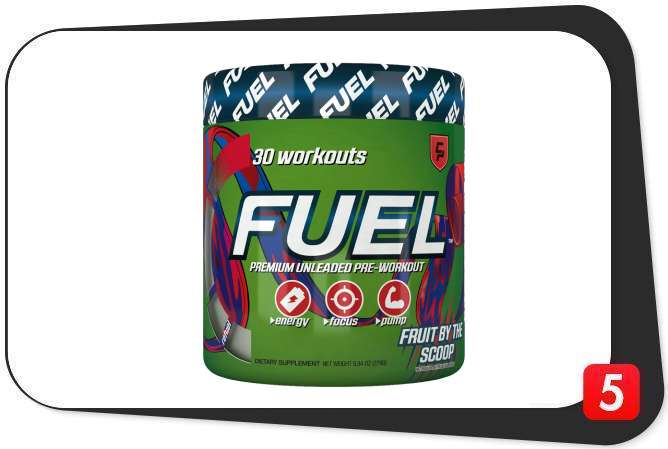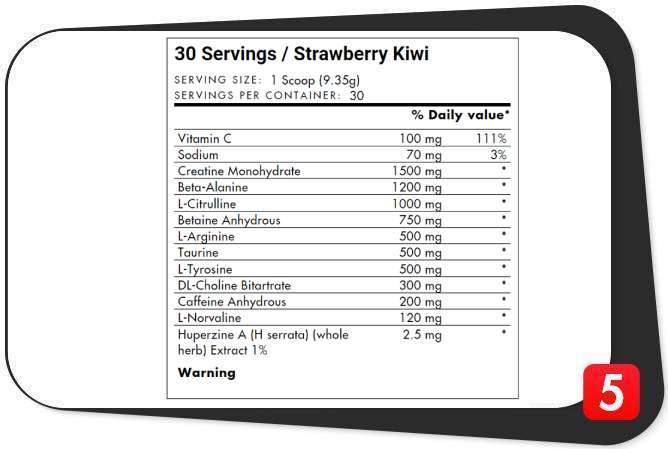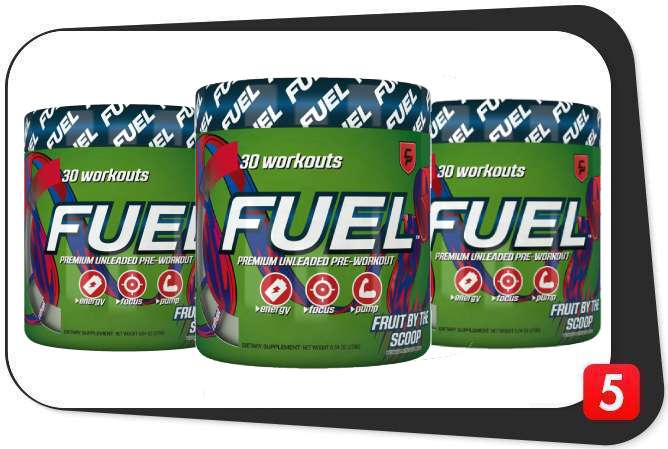 Will This Help You Graduate To The Big Leagues, Or Should It Be Sent Back To Grade School?
Will This Help You Graduate To The Big Leagues, Or Should It Be Sent Back To Grade School?
Campus Protein is a company that knows exactly who their target market is. Their website is littered with pictures of ridiculously healthy-looking college kids, the products are wrapped in bright colors and the list of available flavors reads like Willy Wonka’s latest inventory.
They also offer some sweet merch alongside their products, including water bottles and sweaters that fit the college aesthetic perfectly.
But today we’re only interested in one thing, their FUEL Pre-Workout supplement. We’ll be putting it through rigorous tests and deciding whether Campus Protein have mastered the art of the pre-workout or if they need to be held back a year or two.
Table of Contents
About Campus Protein FUEL Pre-Workout
“Created by the students for the students” is one of Campus Protein’s USPs and apparently it takes six months to perfect a new flavor before they launch it.
The flavors seem to be the main focus on the product page of their website, with the benefits hidden right at the bottom.
Still, the benefits are there, and Campus Protein claim that FUEL will provide:
Energy – Caffeine and Tyrosine provide a mental and physical energy boost to keep you going through a grueling high-intensity workout
Strength – The formula contains Creatine and Betaine to keep your muscles stacked with enough power to withstand the toughest workouts
Stamina – Beta-alanine helps your muscles work for longer, supported by Choline and Taurine
Focus – Huperzine A synergizes with choline to bring your brain and body in perfect alignment
Pump – Citrulline maximizes oxygenated blood flow around your muscles to provide a decent pump during your workout.
Those are the claims anyway, but does FUEL pre-workout deliver on these promised benefits? Let’s take a closer look at the ingredients…
Campus Protein FUEL Pre-Workout Supplement Facts
We’ve reviewed the ingredients for the Strawberry Kiwi flavor here. You may notice a small difference with some other varieties that contain additional flavoring agents, but all of them have these same core ingredients.

Creatine Monohydrate (1500mg)
We’re never upset about seeing creatine in a pre-workout supplement. After all, it is one of the most popular, reliable and scientifically proven supplements around.
Creatine has been repeatedly proven to increase strength and support recovery after exercise, increase lean muscle mass and upper & lower body strength as well as aiding protein synthesis for even greater gains.
Studies on creatine date back to the 60s, but all of these have been conducted in the past five years. Good to know it still works, right?
1500mg is a good serving size for a pre-workout, but it’s not enough to substitute for a standalone creatine supplement.
So, we recommend you use a separate creatine product alongside FUEL Pre-Workout.
Beta-Alanine (1200mg)
A non-essential amino acid, beta-alanine works alongside histidine (one of the 9 essential amino acids) to produce carnosine.
Although your body tends to store good quantities of histidine, beta-alanine levels are generally lower. For this reason, supplementing with beta-alanine will help you produce more carnosine.
But what does carnosine do and why do you want to be making more of it? Carnosine reduces lactic acid build-up in your muscles, meaning you can exercise for longer before succumbing to fatigue.
The effect is most noticeable for explosive exercises like powerlifting or sprinting.
The dose is a bit low, however. Most studies use 3g or more to measure results against.
L-Citrulline (1000mg)
L-Citrulline is yet another non-essential amino acid that makes up the formula of Campus Protein FUEL Pre-Workout. It’s a proven nitric oxide (NO) booster which helps increase blood flow around your muscles during high intensity exercise.
The evidence behind L-Citrulline is pretty conclusive, with studies showing it to increase lean mass after just 4 weeks, increase blood flow around your muscles and helps you exercise for longer while training.
Betaine Anhydrous (750mg)
You may have seen this ingredient under a different name elsewhere – Trimethylglycine or TMG – an interesting little compound that is found in beetroot (well known to be effective at increasing NO).
Betaine is similar in effect to creatine because it helps protect your muscles on a cellular level during exercise. It’s been shown to improve many variables associated with building muscle like power, mass and overall exercise capacity.
The effective dose of betaine is generally considered to be 1000mg or more, so we’re a little light on this one.
L-Arginine (500mg)
It’s interesting that Campus Protein include L-Arginine alongside L-Citrulline because L-Citrulline helps your kidneys to produce L-Arginine and has been proven more effective in boosting workout performance than supplementing with straight L-Arginine.
We suppose Campus Protein were just keen to make sure all bases were covered, but to be honest it’s just wasted space in this formula.
L-Arginine is sometimes used to boost libido and treat ED but the evidence of it being effective is lacking, and this isn’t intended to be that sort of performance enhancer anyway.
The unnecessary inclusion of L-Arginine in Fuel Pre-workout is frustrating because two of the previous ingredients are dosed on the low side; this is 500mg that could have been used better elsewhere.
Taurine (500mg)
Continuing the amino acid theme here – Taurine has become popular in energy drinks over the past decade, but its effects are still being researched.
Here’s what we know so far: Taurine can reduce oxidative stress from high-intensity exercise, aid with muscular recovery and reduce the coronary risks associated with caffeine consumption.
All these mean it makes sense to include it in a pre-workout formula and 500mg is a safe dose.
L-Tyrosine (500mg)
A non-essential (you guessed it) amino acid, L-Tyrosine can help to increase your maximum capacity to exercise, particularly through thermoregulation (keeping you cooler while you work out).
It can also boost mental and physical energy and improve exercise performance.
Most studies have been conducted on much higher doses than this though, some as high as 150mg per kg of bodyweight. So, unless you weigh 3-4kg, the dose in FUEL Pre-Workout is likely to be ineffective.
DL-Choline Bitartrate (300mg)
Choline is used in the production of acetylcholine – a neurotransmitter than enables signals to be sent from the brain to your muscles.
During workouts of more than one hour, choline and acetylcholine levels in your body drop, impeding physical performance.
Long periods without enough choline can lead to muscle damage, so supplementing with it around when you exercise makes perfect sense.
It does not necessarily have a direct impact on exercise performance but can help delay fatigue and improve recovery.
The 300mg included here, however, is significantly lower than the recommended dosage (500mg-750mg minimum per day), especially considering the actual choline content is lower than that. Another opportunity missed.
Caffeine Anhydrous (200mg)
Probably the most widely used drug in the world, caffeine helps to boost energy by blocking adenosine receptors in your brain and allowing levels of other neurotransmitters like dopamine to increase.
Its effectiveness is beyond any doubt, but some have concerns about the coronary risks, which is why it’s great that Campus Protein have included Taurine in the formula, which lowers the risk.
The dose here is equivalent to a strong cup of coffee or a weak energy drink. The maximum recommended dose per day is 400mg for adults, so you can still enjoy a coffee in the morning and take FUEL Pre-Workout with little to no risk, unless you’re particularly sensitive to caffeine.
L-Norvaline (120mg)
Back to amino acids now and L-Norvaline is a somewhat controversial one. Years ago, it was thought that L-Norvaline reduced inflammation and supported muscular recovery.
More recently though there have been reports that it can cause significant damage to your cells, but then in December 2019 another study was released arguing that the potential damage had been grossly overstated and L-Norvaline was safe.
Bearing in mind that the potential benefits to exercise performance are not conclusively proven, including L-Norvaline in the formula is a questionable decision from Campus Protein.
Huperzine A Extract 1% (2.5mg)
Derived from herbs, Huperzine A has been shown to improve cognitive performance and enable better brain-muscle interaction in doses as low as 0.1mg.
One key study discussed how Huperzine A can work more effectively alongside Choline Bitartrate to “improve muscle fiber recruitment” – basically meaning that your muscles work more effectively with both of these molecules present. Campus Protein FUEL Pre-Workout contains both.

Want to see the best pre-workout?
Click here now
Campus Protein Fuel Formula Analysis
If you ignore the serving size of each of the ingredients, the overall formula seems to work quite well. Creatine and Betaine provide energy directly to your muscles to improve your results from training – great.
The Caffeine and Taurine synergize well to provide a low risk boost in mental energy and focus as well as combating fatigue while you exercise – fantastic.
Beta-alanine, Citrulline and Tyrosine all combine to help you maintain a high intensity for longer by boosting muscle performance and keeping you energized – awesome!
And the combination of Choline and Huperzine will give you a laser-like focus and help you keep concentration and form by enabling lighting fast brain-muscle communication – amazing!
The problem is that when you factor the serving sizes in again, it starts looking much less appealing. Beta-alanine, Betaine, Tyrosine and DL-Choline Bitartrate are all dosed in the low range, rendering them possibly ineffective.
Given that these are four of the most scientifically supported ingredients in the formula, this is disappointing.
In our opinion, the formula would look a lot better if Campus Protein dropped the Arginine and Norvaline and boosted up the four ingredients mentioned previously.
Campus Protein FUEL Pre-Workout Benefits
Let’s go back to those five benefits we highlighted back at the top of the article and see how confident we are in them now.
Energy – For sure, FUEL will give you a good, but not insane, boost in energy before your workout. As would any caffeine boost.
Strength – Although we would like to see more Betaine here, you should still notice a difference in your strength and power output from taking FUEL Pre-Workout.
Stamina – Because Beta-alanine and Tyrosine are given in low doses, you may not notice a significant increase in stamina, but you’ll still enjoy a higher overall capacity to exercise.
Focus – Choline and Huperzine make a great combination for improving focus and concentration, one that is supported by the caffeine as well, so you should in theory feel more focused after taking FUEL. The poorly dosed choline, however, may weaken this aspect.
Pump – FUEL will give you a slightly better pump thanks to the Citrulline content, but don’t expect to be walking out of the gym looking like Schwarzenegger within a week!
Who Takes It?
Regardless of whether you’re in college or not, you might consider taking Campus Protein FUEL Pre-Workout if you’re looking for a pre-workout supplement that is easy on the stimulants.
It’s probably best suited to beginner and intermediate bodybuilders who are as interested in whether something tastes good as they are about how effective it might be.
Any Potential Side Effects with FUEL Pre-Workout?
Caffeine is well known to have some potentially unwanted side effects, from jitters, anxiety and nausea to more serious ones. This is more a risk in higher doses – and FUEL also includes taurine to reduce any side-effects – so the risk is low here.
More than 1g of beta-alanine may give you the tingles in your hands and feet but, while disconcerting, this is perfectly safe.
Most of the remaining ingredients are safe in the doses provided, including L-Norvaline which is likely safe, although the negative press recently doesn’t help, and Campus Protein might have been better off leaving this ingredient on the laboratory shelf.
Campus Protein FUEL Pre-Workout Summary
There are good things and bad things to be said for Campus Protein FUEL Pre-Workout and we’ve summarized them below;
Pros
- Increased energy
- Greater strength
- More lean muscle
- Cost-effective, especially if you buy in bulk and on subscription
Cons
- Many ingredients dosed below the effective range
- Some ineffective ingredients are included which wastes space
Pricing & Where to Buy
Campus Protein FUEL Pre-Workout comes in a range of flavors and they all vary slightly in price. Tubs contain 30 servings, but you can save by purchasing 60 servings at once.
They also offer a subscription service similar to Amazon which works out even cheaper.
You can grab your FUEL from the Campus Protein website at roughly these prices;
- 30 Servings = $25.00 – $28.00 or $21.00 – $23.00 on subscription.
- 60 Servings = $40.00 or $32.00 on subscription.
Campus Protein FUEL Pre-Workout Review: Conclusion
As you may have guessed by now, we’re not crazy about Campus Protein FUEL Pre-Workout.
It’s not that it’s bad; it’s just that they seem to have crafted their formula by including a little bit of everything that might work, rather than focusing on a smaller number of things that definitely do work.
The result is an almost anaemic formula that could almost be the product of a group project where the students couldn’t decide what to focus on, so they just threw everything in there. “Created by the students, for the students” rings very true here.
So, the final verdict is that Campus Protein FUEL Pre-Workout is a good starter pre-workout, but with a little refinement it could be much, much better.
[yasr_overall_rating]
Leave a Reply